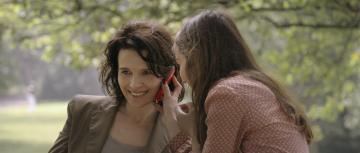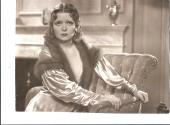Erotic `Elles': Juliette Binoche is fearless, but the insights are less so
What's new in the world's oldest profession?
That might've been the snappy headline of Anne's investigative article in Elle, had it turned out the way she and her editor expected. But what article -- or sexual experience -- ever does?
English has no nice equivalent of "Elles" -- the gender-dedicated plural of "she" -- and Hollywood has no equivalent of this frank French foray into prostitution, driven by three intensely erotic female performances.
Foremost is that of Juliette Binoche, arguably the finest -- and certainly the most intelligent -- European actress of our day. The film is so explicit, with its rare NC-17 no-no rating, that I can't even describe the opening (pre-credits) scene. Suffice to say it's a wildly sexual dream sequence in which Anne is jolted awake by a child whining, "Mom, there's no more Cocoa Krispies!"
Rating: NC-17 for explicit sexual content.
Poor Anne. She's been working day and night, immersed in her assignment about college girls who subsidize their studies by selling sex. The deadline is approaching, and Anne is frazzled. Her older son is in deep adolescent rebellion. She's hosting an important dinner party tonight for some important business friends of her husband. She has an affluent lifestyle, a big Parisian apartment, expensive clothes -- and a lot of stress.
Close encounters with her two young sex subjects will add to it. Both Alicja (Joanna Kulig) and Charlotte (Anais Demoustier) are casual about what they do. Disturbingly casual. Anne is shocked by hearing Charlotte answer one of her (constant) cell phone calls: "I have small breasts ... Yes, I do that ... Yes, without a condom ...."
She's not afraid -- without a condom?
"No," answers the girl. "Most of them only sleep with their wives."
What made her go into such a business?
"Well, it wasn't really a conscious decision. It's like smoking ... hard to quit once you start. You get used to the money, and it doesn't really take much time."
Alicja is even more matter-of-fact:
"It's just straight sex. I do the same as with my boyfriend -- but with clients, I'm more in control. They pay by the hour, take a shower when they arrive -- that takes up some time -- and they go home right after. They love to talk about their lives, jobs, wives -- mainly work...."
The mundanity lacks humanity. But Anne gradually comes to see they've got things she hasn't -- independence, adventure, open-mindedness -- and, once drawn into their lives, starts to doubt the privileged shallowness of her own.
Not to mention her marriage, family and her personal sexuality.
Bored husbands pay the girls "to do stuff they can't do with wives," one of them explains. Anne asks if it's humiliating. "No, it's kind of exciting... What about you?"
In the quietly condescending tone of the reporter/therapist, Anne replies, "I don't think we're here to talk about me."
Oh, yes we are...
That's the way the cookie and the clinical detachment crumbles.
Polish director Malgorzata Szumowska ("33 Scenes From Life," 2008), who co-wrote the screenplay with Tine Byrckel, does a good job of contrasting and intertwining the girls' gigs with the journalist's domestic routines. That broken refrigerator door is driving Anne crazy, and she looks like hell. Ms. Szumowska structures the story somewhat along the lines of Virginia Woolf's "Mrs. Dalloway," as a day in the life of a woman thinking about -- and distracted from -- her dinner preparations.
In fact, this dinner party will end up resembling Edward Albee's "Virginia Woolf" more than Mrs. Dalloway's.
Ms. Binoche's rendering of Anne's verge of a nervous breakdown is haunting (as is the use of Beethoven's Seventh Symphony allegretto movement), especially when she finally gets a little drunk and sexy. More than a little, in fact. She is Streep without the mannerisms, seemingly oblivious to the camera or any audience. It's a fearless portrayal of a woman's deep doubt and confusion, and a real showcase for her, like her previous terrific work in "Certified Copy" (2010), "Chocolat" (2000) and "The Unbearable Lightness of Being" (1988).
Ms. Demoustier and Ms. Kulig are likewise excellent, but, trouble is -- their characters are not. Asked what the hardest thing about hooking is for her, Charlotte replies: "The lies -- having to lie all the time." It's one of few real revelations. Otherwise, the script largely fails to flesh these young sex workers out (pardon the phrase), as if they were so baffling even their creator doesn't know what to do with them.
Or with the ending. As the Strauss-Kahn affair suggests, neither feminism nor the 21st century has had much corrective impact on the French macho culture, or on sexual commerce in general. The lurid sex scenes in "Elles" -- sapphic, graphic and otherwise -- are a voyeur's joy but more titillating than satisfying in any truly erotic (let alone cerebral) way. Don't look for profound insights or social prescriptions.
Perhaps the point is that there's not much difference between Anne and the girls' other clients: She, too, is paying them for their time and psychological striptease. Come to think of it, a case could be made that there's not much difference between prostitution and journalism -- or banking or law or aromatherapy.
People do all sorts of dubious things for money.
# # #
(In French and Polish with English subtitles.)






